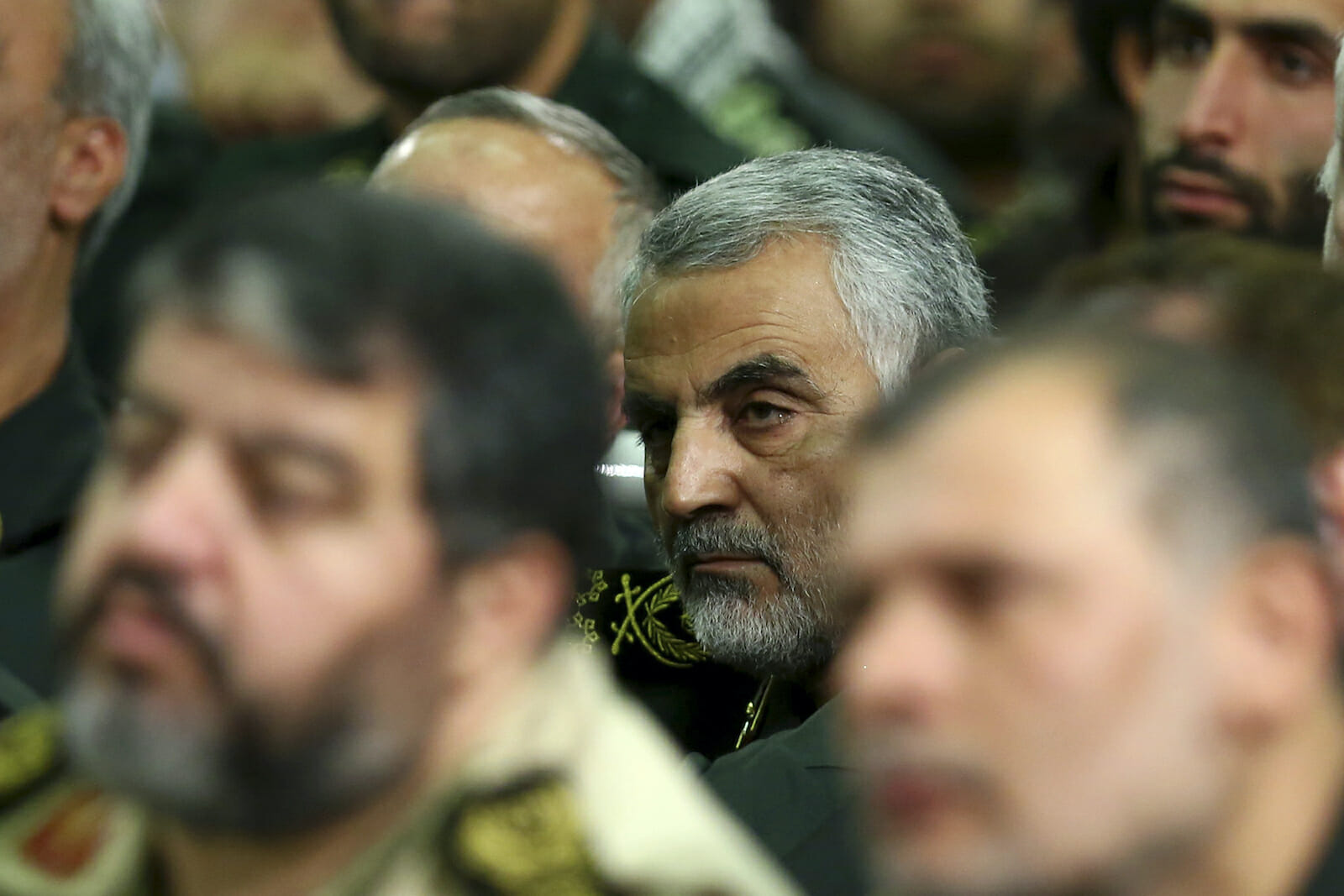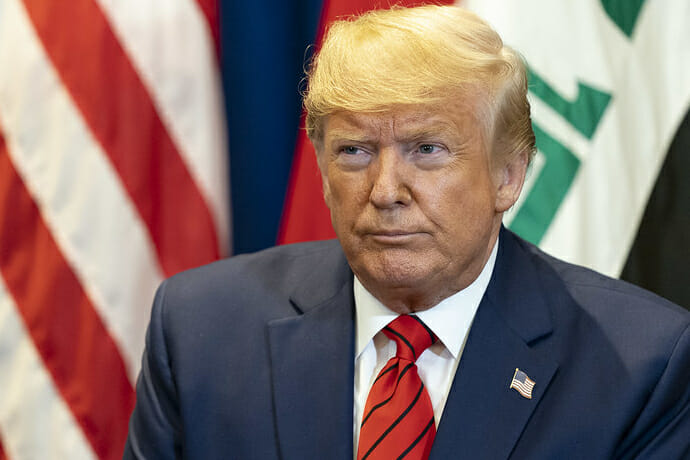
On Dealing with Iran Now
It is absolutely dumbfounding to me, once again, the difference between the left and the right’s respective political rhetoric in response to Soleimani’s elimination.
The left and most media are going on about how this man was an Iranian official. A general of a recognized state, that there will be retaliation, and that it’s dangerous escalation to have taken him off the chessboard. That Iran will now have cause for retaliation and escalating its violence against U.S. persons and interests. More so incomprehensibly, many on the left and media claiming that President Trump’s right to take such a decision is very questionable? Meanwhile, with their next breath, these same voices are admitting the threat, past crimes and attacks on the U.S. that this Iranian general was responsible for.
First of all, President Trump, as any American president, is the commander-in-chief of the United-States of America. As such, as the president of the United States, one of his ultimate and constitutionally protected and in fact assigned prerogatives is foreign policy and political-military affairs. This includes the right to drone bomb a threat to American and Western national security. These prerogatives even include the right of the president to deploy the U.S. military anywhere in the world that the president seems fit, for a maximum of 90 days, without ever needing a Congressional declaration of war nor approval; all the president owes Congress is a notification within 48 hours that he took action.
One must remember the Wech Baghtu airstrike when President Obama drone bombed an Afghan wedding in order to eliminate a handful of medium-level Taliban; in doing so killing dozens of children, women, old folks, innocents, without ever hearing a single reproach from anyone in Congress.
An unfortunate situation
Because of this act, Iran now has cause many say? Really? Well, what about America having cause? Democrats and many in the media say this elimination is an act of war on the part of the United States. Well, what about all the attacks and killings of Americans that Iran, and Qassem Soleimani specifically, have ordered and carried out? What about the acts of war of Iran and Qassem Soleimani?
Does America go around killing Iranian nationals and targeting Iranian governmental assets? With the exception of this one elimination, and in response to or as preventive action against national security threats only, no, no it does not. All America does is work and enact policy that prevents Iran from acquiring militarily-useable nuclear capabilities, or of becoming an internationally-destabilizing regional hegemon to the great detriment of Israel, Iraq, Jordan, Saudi Arabia, Egypt, the Gulf States, India, progress made in Afghanistan, and international peace and stability overall.
….targeted 52 Iranian sites (representing the 52 American hostages taken by Iran many years ago), some at a very high level & important to Iran & the Iranian culture, and those targets, and Iran itself, WILL BE HIT VERY FAST AND VERY HARD. The USA wants no more threats!
— Donald J. Trump (@realDonaldTrump) January 4, 2020
Yet the rogue Iranian government goes around ordering the killing and attacking of American, Saudi and Israeli assets. This regime is and has always been supportive of Hezbollah’s takeover of Lebanon, which is also why Iran needs a friendly Syria and Assad to remain in power. All in pursuit of regional domination as well as to expand territory, if not simply establish satellite-nations, in order to regain direct access to the Mediterranean (one of Persia’s historically oldest geopolitical goals). Coming back to Iraq where the airstrike and battlefield is taking place, Iran also supports the Iraqi version of Hezbollah, called Kata’ib Hezbollah. A radical group which works to promote a pro-Iranian Iraq, and which was founded and led by an Iranian-Iraqi named Abu Mahdi al-Muhandis who was killed alongside Soleimani on January 3rd.
Let us remember that this recent series of events happened as a back and forth game of retaliation that has now definitely escalated. On December 27th, 2019, a barrage of some 30 rockets were fired by Kata’ib Hezbollah militants on U.S. forces in Iraq, killing one U.S. person and wounding many. In response, on December 29th, the U.S. launched an airstrike on Kata’ib Hezbollah headquarters, near the town of Al Qa’im. Then in response to that, on December 31st, Abu Mahdi al-Muhandis himself led Kata’ib militiamen in violent protest and attacked the U.S. embassy inside the Green Zone in Baghdad. On January 3rd, 2020, still in Iraq, a U.S. airstrike targeted Abu Mahdi al-Muhandis and his visiting patron and ally Iranian General Qassem Soleimani.
In short: all that has inherently happened this week is that the U.S. has simply taken down a terrorist. Eliminated a man ordering attacks against U.S. persons, working against regional peace, with innocent blood on his hands and who was working tirelessly to kill more. A man that was doing all this as an official and in the name of a nation-state that is indeed UN-recognized, but yet is authoritarian and acting in a belligerent way. Blatantly attacking Americans and Westerners, Iran’s actions have undermined peace and stability efforts in the region, as well as frustrated the global economy and flow of oil, by actively fermenting war and chaos in neighboring countries, the region and therefore the world. Every action the regime of Iran undertakes threatens the status-quo, pushes the boundaries of regional and international peace to the brink of conflict; as well as ignores international law, including human rights law and non-proliferation treaties.
My humble verdict
That is why at the end of the day, enough is enough, while I never take pleasure or call for the death of anyone, Qassem Soleimani and Iran have repeatedly been guilty of acts of war. Consequences are unfortunate but were inevitable. And many could say that Soleimani felt comfortable pursuing his agenda believing, through experience, that the American government considered him untouchable due to his status. He and the regime of Iran were wrong, and there is no reason any westerner should mourn, nor doubt or question the right of the U.S. president to order the elimination of this man or his kind.
Concerning the handling of such men, of murderers, of terrorists, of political and religious extremists, of dangers to the Western way of life and viability of international peace, it is this Western realist’s opinion that the Western World’s resolve needs to always be strong, swift, intransigent, decisive and most importantly united. The same goes for the handling of regimes that employ, train, elevate, encourage, enable, order and finance men like the Osama bin Ladens and Soleimanis of this world. Whether a foreign government official, or not, does not matter; aggressive and unquestionable threats need to be dealt with one way or the other, period.
All in all, America answered this threat somewhat appropriately. Extremist, authoritarian and theocratic regimes and the Qassem Soleimanis of this world are the problem, not President Trump. Not the West, nor those in the West that are resolved to protect and defend the global legal system and world order that has brought peace, prosperity and a level of international stability that this World had never before known.
Right move?
On another note, while the president’s legitimate prerogative in taking this decision should not be in question, whether it was the right move or not absolutely can and should be? Truth be told, were I in the presidential seat, I would not have eliminated Qassem Soleimani. I would have instead ordered a campaign to isolate him, by taking his ability to be efficient and threaten the United-States away. Imminent attack or not, there was still time for such a response policy. As even if an attack and threat was truly imminent, whether days or even a couple of months away, matters little; by now enough planning by Soleimani would already be formulated and in action, which means that taking the brain away is already too late to thwart this particular attack from being put into action by those that have survived Soleimani and al-Muhandis.
One way of isolating him would have been to eliminate his top-ranking personnel and right-hand men for instance; and/or eliminating his top captains in the field, his top people and contacts in other nations, those that made his plans to attack Western targets possible, decimating the key strategic allies and players of his regional and international network of state and non-governmental assets and capabilities. Leaving him slowly but surely alone, unable to protect his own manpower, forced to take time to find and groom replacements he trusts and can count on; making him look like a failure at home, forcing his own replacement, all wasting time the Ayatollah regime does not have.

For at this point, by just killing him, we’ve inherently just killed only one man. And history has proven that the elimination of a top threat, of a chief terrorist, of the head, only then creates a hydra-like string of less individually-powerful yet even bolder, more violent and extremist men; and thus creates a much bigger and less controllable, not to mention more difficultly identifiable, threat. The replacement of such men, even if another individual strong-man steps up instead of a committee, is always worse.
So I believe it wasn’t the right move to eliminate the devil we know. And the fact is, although decisiveness in a president is a good thing, this particular elimination and the very public move will just unite the West’s enemies more than anything, even help their recruitment efforts. Now Iranians have stopped protesting their regime, while Iraqis have stopped protesting against Iran and its ingérence in Iraq. Meanwhile, Shi’ite radicals around the world are professing their eternal loyalty to Ayatollah Khamenei and renewing oaths of vassalage to Tehran, emboldened and motivated as ever to act against the United-States and the West.
As for the street protests of mourning civilian crowds calling for vengeance, one must remember that we are dealing with an authoritarian regime. Masters of propaganda, they will have no qualms and spare no expense in incentivizing people by forcing or paying them to attend these demonstrations. The regime forcing many in Iran, paying many in Iraq and elsewhere, would not be unheard of.
This is just like in Nazi Germany, when Reinhard Heydrich was killed in Prague. Sure the funeral was elaborate, sure many citizens officially and publicly mourned, many protested their sadness and admiration for him in public and for the cameras, but I’m sure very few anywhere in fact missed or regretted the man nicknamed “the Butcher of Prague.” Just like if Himmler had been killed during the Nazi regime. Yes, the show of propaganda would have been epic, but for the overwhelming majority, the mourning wouldn’t have been truly genuine.
Consequences to be expected
Yes, this elimination of Soleimani sends a message; but that kind of message only works with Westerners, and not at all with Middle Easterners, Semites, Persians, and other tribal honor-based socio-cultures. This elimination, as anyone who understands the region knows, will just create a high level and religious martyr for our Shi’ite extremist enemies to all flock to, and thus only strengthen Iran’s position in the region and also the Ayatollah regime’s support at home.
As a good example of how people in the Middle East think, and thus an indication of how they may react, there is an old Arab proverb which goes as follows: “It’s me against my brother; my brother and I against our cousin; my brother, my cousin and I against the foreigners/infidels.” The Iranian people are likely to despise the U.S. for killing someone who is indeed not innocent, but one of their own nonetheless. This was someone that many in Iran did consider a hero for his role fighting ISIS, and a rampart against Sunni threats to Shi’ite Iran. Such an act will indeed provide internally-unifying propaganda for the Ayatollahs to use, helping them to unify their nation-state around their regime, policies, and interests. For many more in both Iraq and Syria however, Soleimani was known as the children killer general and will most probably not be missed. In fact, rejoicing was seen in the region, in Syria most notably, where Soleimani perpetrated terrible crimes against humanity and massacred children in support of the Assad regime. While many in the West would agree that Soleimani’s elimination only helps the remnants of ISIS, and other non-Tehran controlled radical groups.
Yet the most probable fact is, if we are honest, this decision of eliminating Soleimani was an electoral political move, more than a decisive goal-oriented and strategic formulation of foreign policy. Americans do not like unfinished business, never have and never will. That means that if a first term U.S. president wants to better ensure re-election, a good call is to ensure the United-States is involved in an intervention, a conflict, or is at war or dealing with war-like tensions. That way, the people will re-elect that president so that his or her administration may finish what it started; one can look to George W. Bush’s re-election being a strong point-in-case of a war-time president’s re-electability.
Same way that if a first term president gets elected inheriting a conflict, especially if that conflict was not started by the new president’s party, that person as a candidate will have most probably spoken of de-escalation of the conflict as a promise during the presidential campaign; and their best move electorally, for ensuring re-election as president, is to begin withdrawal from that inherited conflict long enough before the election. One can look this time to President Obama’s re-election, as a strong point-in-case of a president’s re-electability if they appear to manage the ending of a conflict and overall withdrawal well enough.
Back to Iran, it will be interesting to watch how this situation develops. That being said, this geopolitical theorist does not believe it will ever come to actual war; unless the United-States itself starts the war, of course. If anything it will be a hybrid war of attrition, a war of perception. The Ayatollahs are politico-religious fanatics yes, but not crazy nor lacking lucidity. Their fanaticism draws the line at national and regime suicide. They have much to lose and want to remain in power above all, just like in the North Korea case.
So, cyber conflict, drone and missile skirmishes around the Strait of Hormuz and along the Iranian border, proxy hybrid war in Iraq primarily, in the region and elsewhere around the globe, no-signature terrorist and sabotage attacks, Iran pushing allied radical groups to ramp-up their own attacks on American and Western interests and assets globally, a more divided and destabilized Iraq, a notable boost in Iran’s secret nuclear-proliferation efforts, the expansion of the regional arms race between Iran, Saudi Arabia, the U.S. presence which shouldn’t leave Iraq, Egypt, Turkey and in reaction Israel, will all most likely become an increased reality of the regional geopolitical situation indeed. Meanwhile, however, the Ayatollah and Revolutionary Guard’s regime will stretch their budgets as their power and authoritarian grip on Iran continues to erode naturally.
Solution proposal
The only true solution and strategy that will work in this situation with Iran, in this political scientist’s opinion, is to continue to isolate Iran diplomatically; while squeezing Iran itself, both financially and economically. Creating the type of stranglehold on its economy that pushes Iranians to take to the streets in protest; in turn forcing the government to reveal itself violent, repressive, truly authoritarian and willing to turn on its citizens. Irremediably breaking, in doing so, any trust there may exist between the governed and their theocratic authoritarian government as well as the socio-political elite whose interests are intertwined with those of the regime.
When Iranians begin to go hungry and can’t make ends meet, when they believe things are worse today than yesterday and continually getting worse, with no promising future ahead; then the regime of the Ayatollahs will be brought down from the inside. History has proven the strategy of encouraging ‘crumbling from the inside’ to be the best way to move forward against belligerent authoritarian regimes; such a strategy has a high rate of success, and the added benefits of costing practically no military lives, less loss of life and bloodshed in general (especially on our side), less geopolitical destabilization regionally and internationally, less damage to America’s “Shining City Upon a Hill whose beacon of light guides freedom-loving people” brand, and basically less costs politically, militarily and financially.
Western nations, the United-States, must especially remember that this is not a conflict with a nation but a regime. We must make no mistake either; Iranians will unify to fight a war against foreigners and non-Shi’ite Muslims, even for this regime. At the same time, however, as most nations and proud people around the world would, Iranians prefer exercising the right to change their regime themselves and without outside interference. It’s only fair a people get to wash their laundry internally and in private, for not to worry the Iranians have a tooth to pick with their oppressive government; the Ayatollah regime’s time will come and is already running out. All that Western nations can and should now do for positive regime-change to successfully occur in the Islamic Republic of Iran, is to pursue diplomatic policy and enact economic sanctions that encourage the right domestic environment for a democratic revolution to happen from the inside.

